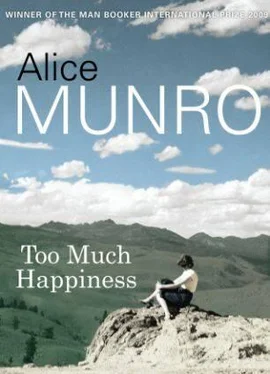“You might say that he was. You surely remember how I left him and you recommended me to Mittag-Leffler?”
“In Stockholm. Yes? You left him. Well. It had to be done.”
“Yes. But it is over now and I am going to marry a man of the same name but not closely related and a different sort of man entirely.”
“A Russian, then? Does he read fossils also?”
“Not at all. He is a professor of law. He is very energetic and very good-humored except when he is very gloomy. I will bring him to meet you and you shall see.”
“We will be pleased to entertain him,” said Weierstrass sadly. “It will put an end to your work.”
“Not at all, not at all. He does not wish it. But I will not teach anymore, I will be free. And I will live in a delightful climate in the south of France and I shall be healthy there all the time and do all the more work.”
“We shall see.”
“Mein Liebe,” she said. “I order you, order you to be happy for me.”
“I must seem very old,” he said. “And I have led a sedate life. I have not as many sides to my nature as you have. It was such a surprise to me that you would write novels.”
“You did not like the idea.”
“You are wrong. I did like your recollections. Very pleasant to read.”
“That book is not really a novel. You would not like the one I have written now. Sometimes I don’t even like it myself. It is all about a girl who is more interested in politics than in love. Never mind, you will not have to read it. The Russian censors will not let it be published and the world outside will not want it because it is so Russian.”
“I am not generally fond of novels.”
“They are for women?”
“Truly I sometimes forget that you are a woman. I think of you as-as a-”
“As a what?”
“As a gift to me and to me alone.”
Sophia bent and kissed his white forehead. She held back her tears till she had said good-bye to his sisters and left the house.
I will never see him again, she thought.
She thought of his face as white as the fresh starched pillows that Clara must have placed behind his head just that morning. Perhaps she had already taken them away, letting him slump down into the softer shabbier ones beneath. Perhaps he had fallen asleep at once, tired out from their exchange. He would have thought that they were meeting for the last time and he would have known that the thought was in her mind as well, but he would not know-this was her shame, her secret-how lightened, how free, she felt now, in spite of her tears, freer with every step away from that house.
Was his life, she thought, so much more satisfactory to contemplate than his sisters’?
His name would last awhile, in textbooks. And among mathematicians. Not so long as it might have done if he had been more zealous about establishing his reputation, keeping himself to the fore in his select and striving circle. He cared more for the work than for his name, when so many of his colleagues cared equally for both.
She should not have mentioned her writing. Frivolity to him. She had written the recollections of her life at Palibino in a glow of love for everything lost, things once despaired of as well as things once treasured. She had written it far from home when that home and her sister were gone. And Nihilist Girl came out of pain for her country, a burst of patriotism and perhaps a feeling that she had not been paying enough attention, with her mathematics and the tumults of her life.
Pain for her country, yes. But in some sense she had written that story in tribute to Aniuta. It was the story of a young woman who gives up the prospect of any normal life in order to marry a political prisoner exiled to Siberia. In this way she ensured that his life, his punishment, should be somewhat alleviated-southern instead of northern Siberia-as was the rule for men accompanied by their wives. The story would be praised by those banished Russians who might manage to read it in manuscript. A book had only to be refused publication in Russia to engender such praises among political exiles, as Sophia well knew. The Raevsky Sisters -the recollections-pleased her more, though the censor had passed it, and some critics dismissed it as nostalgia.
She had failed Weierstrass once before. She failed him when she had achieved her early success. It was true, though he never mentioned it. She had turned her back on him and on mathematics altogether; she had not even answered his letters. She went home to Palibino in the summer of 1874, with her degree won, stored in a velvet case, and then put away in a trunk, to be forgotten for months-years-at a time.
The smell of the hay fields and the pine woods, the golden hot summer days, and the long bright evenings of northern Russia intoxicated her. There were picnics and amateur plays, balls, birthdays, the welcome of old friends, and the presence of Aniuta, happy with her year-old son. Vladimir was there as well, and in the easy summer atmosphere, with the warmth and wine and long merry suppers, the dances and the singing, it was natural to give in to him, to establish him after all this time as not just her husband but her lover.
This was not done because she had fallen in love with him. She had been grateful to him, and had convinced herself that such a feeling as love did not exist in real life. It would make them both happier, she thought, to agree with what he wanted, and for a while it did.
In the autumn they went to Petersburg, and the life of important amusement continued. Dinners, plays, receptions, and all the papers and periodicals to read, both frivolous and serious. Weierstrass begged Sophia, by letter, not to desert the world of mathematics. He saw to it that her dissertation was published in Crelle’s Journal for mathematicians. She barely looked at it. He asked her to spend a week-just a week-polishing up her work on the rings of Saturn, so that it too might be published. She could not be bothered. She was too busy, wrapped up in more or less constant celebration. A celebration of name days and court honors and new operas and ballets, but really, it seemed to be, a celebration of life itself.
She was learning, quite late, what many people around her appeared to have known since childhood-that life can be perfectly satisfying without major achievements. It could be brimful of occupations which did not weary you to the bone. Acquiring what you needed for a comfortably furnished life, and then to take on a social and public life of entertainment, would keep you from even being bored or idle, and would make you feel at the end of the day that you had done exactly what pleased everybody. There need be no agonizing.
Except in the matter of how to get money.
Vladimir revived his publishing business. They borrowed where they could. Both of Sophia’s parents died before long, and her inheritance was invested in public baths attached to a greenhouse, a bakery, and a steam laundry. They had grand projects. But the weather in Petersburg happened to have turned colder than usual, and people were not tempted even by steam baths. The builders and other people cheated them, the market became unstable, and instead of managing to make a reliable foundation for their lives they went deeper and deeper into debt.
And behaving like other married couples had the usual expensive result. Sophia had a baby girl. The infant was given her mother’s name but they called her Fufu. Fufu had a nurse and a wet nurse and her own suite of rooms. The family employed also a cook and a maid. Vladimir bought fashionable new clothes for Sophia and wonderful presents for his daughter. He had his degree from Jena and he had managed to become a subprofessor in Petersburg, but this was not enough. The publishing business was more or less in ruins.
Читать дальше












